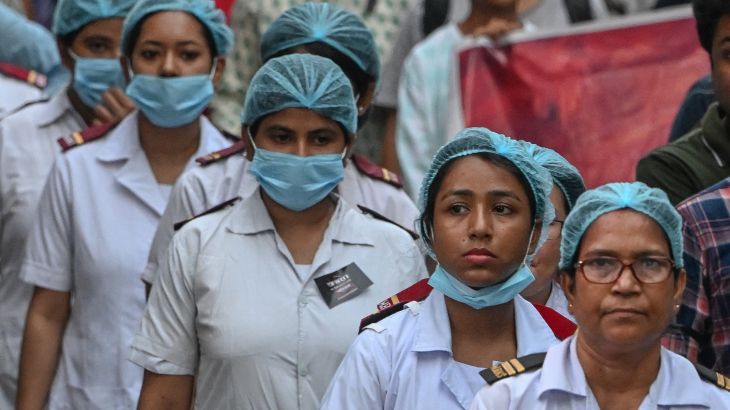Indian doctors call nationwide strike over rape and murder of Kolkata medic
Hospitals to suspend non-essential services and medical procedures on Saturday as public fury over brutal attack grows.
Video Duration 02 minutes 11 seconds 02:11Published On 16 Aug 202416 Aug 2024
Indian doctors have called for a nationwide shutdown of hospital services as public fury over the rape and murder of a trainee medic in the eastern city of Kolkata last week grows.
The Indian Medical Association (IMA), the country’s largest grouping of medics, said the 24-hour shutdown would be implemented on Saturday, affecting most hospital departments except for essential services.
Keep reading
list of 3 itemsend of list
The shutdown comes after thousands of people took to the streets in several cities to express their outrage at the rape and murder of a 31-year-old trainee doctor, whose brutalised body was found on August 9 at Kolkata’s state-run RG Kar Medical College and Hospital.
“Doctors, especially women are vulnerable to violence because of the nature of the profession. It is for the authorities to provide for the safety of doctors inside hospitals and campuses,” the IMA said in a statement issued on Thursday on X .
Multiple medical unions in both government and private systems have backed the strike.
Doctors in government hospitals across several states on Monday had halted elective services “indefinitely” in protest.
Indian media have reported that the murdered doctor was found in the teaching hospital’s seminar hall, suggesting she had gone there for a brief rest during a long shift.
An autopsy confirmed sexual assault. Doctors say the circumstances of the rape point to the vulnerability of medics left without proper protection and facilities.
Though police have detained a man who worked at the hospital helping people navigate busy queues, state government officers have been accused of mishandling the case.
Little has changed
There were more than 31,000 reported rapes in 2022, the latest year for which data is available, according to the National Crime Records Bureau (NCRB).
The gang rape and murder in 2012 of a young woman on a bus in Delhi, northern India led to nationwide protests and outrage over the country’s failure to tackle sexual violence against women.
At about the time of the 2012 attack, police were recording up to 25,000 rape cases a year across India, NCRB data showed.
A woman holds a candle during a vigil in Mumbai condemning the rape and murder of a trainee medic at a government-run hospital in Kolkata [File: Francis Mascarenhas/Reuters]
Since 2012, the government has brought in sweeping changes to the criminal justice system, including tougher sentences and the death penalty for repeat offenders.
Conviction rates for rape ranged between 27-28 percent from 2018-2022, according to NCRB data.
The definition of rape has also been widened to include non-penetrative acts and the age threshold for rape trials lowered so 16-year-olds can be tried as adults.
But campaigners say little has changed despite the tougher laws.
Criminal lawyer Rebecca M John, who has represented many rape victims, said some rapists still believe they can get away with their crime.
“One of the factors would be the absence of fear of the law,” she said.
